Grad Internship Program Students
Meet some students who have had graduate internships.
Summer 2023 Internships
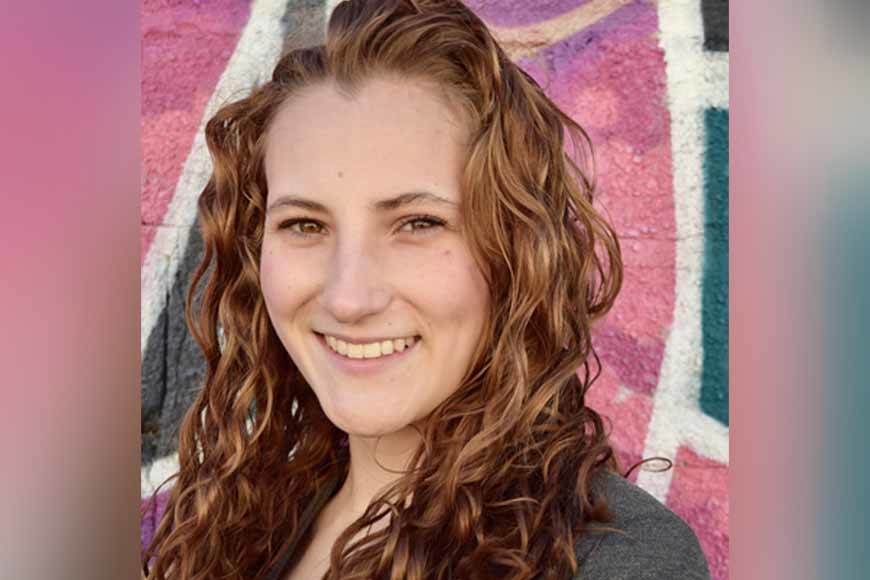
|
Kate CarosellaDepartment of Psychology A summer internship gave graduate student Kate Carosella a chance to apply data analytics to public health work and provided examples of a possible career path and an ideal work environment. |
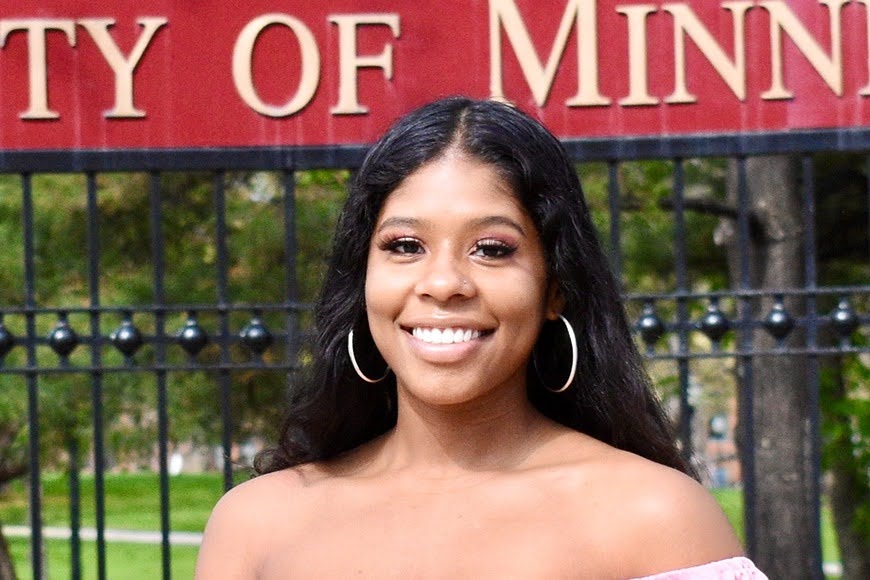
Lisette Horne in front of the University of Minnesota sign: Photo by Allary Horwath
|
Lisette HorneDepartment of Psychology Lisette Horne is a second-year PhD student studying social psychology in the Department of Psychology. This past summer, she interned at the University of Minnesota Office of Equity and Diversity developing DEI (diversity, equity, and inclusion) resources and learning how psychological research can be applied to create a more diverse and equitable workplace. |
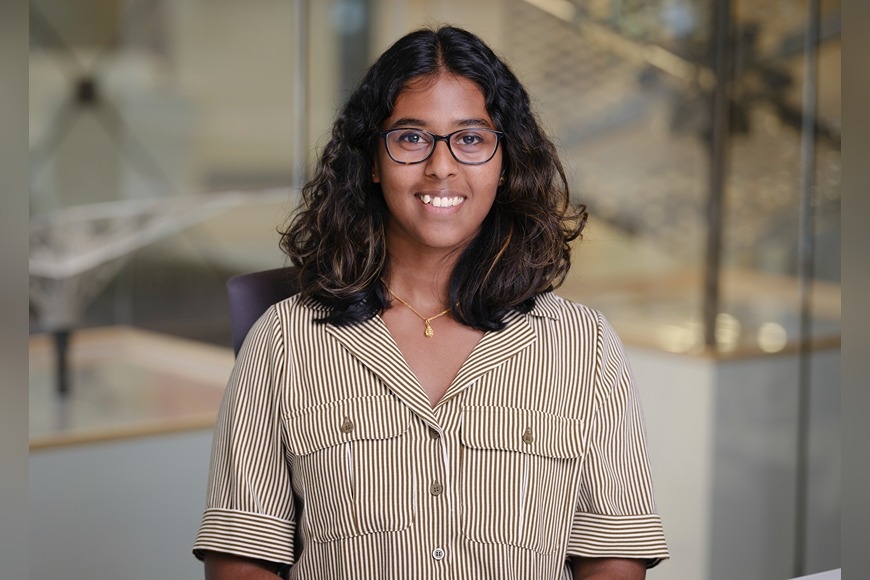
Mathi Manavalan at HKS headquarters. Photo by Daryl Shields
|
Mathi ManavalanDepartment of Psychology Fifth-year graduate student, Mathi Manavalan, is pursuing her PhD in psychology, specializing in cognitive and brain sciences, with a minor in translational sensory sciences. As she is getting prepared to get her doctorate, she shares with us her 12-week summer internship experience at HKS, an international architecture firm headquartered in Dallas, Texas. |
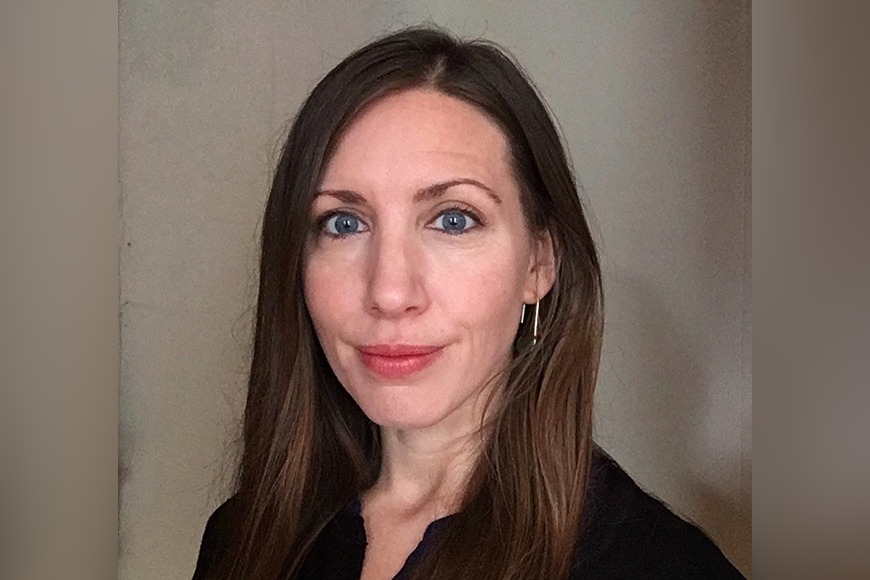
Tayler Nelson
|
Tayler NelsonDepartment of Sociology This past summer, Tayler Nelson, a PhD Candidate in Sociology with a minor in Development Studies & Social Change, interned with Women’s World Banking, a nonprofit organization that helps low-income women access financial services. Nelson’s internship proved to be an insightful experience, challenging her to hone her research and collaboration skills and to reassess her view of industry work. |
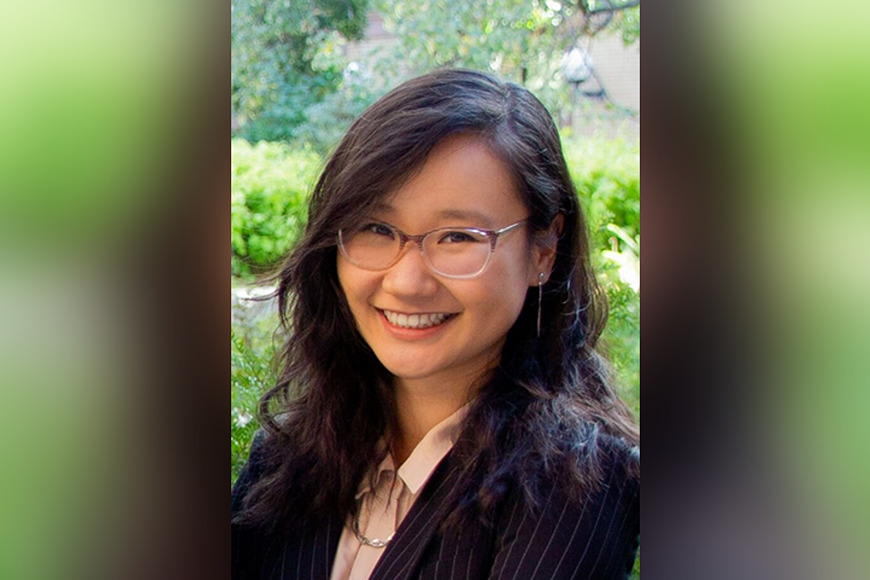
|
Linh NguyenDepartment of Psychology Linh Nguyen, a fifth-year graduate student majoring in psychology and statistics, completed a 12-week internship at Allianz this summer. This experience not only allowed Nguyen to experience the day-to-day work of a data scientist in a corporate setting but also gave her a newfound appreciation for the unique skill sets that are cultivated in a strong social sciences program. |
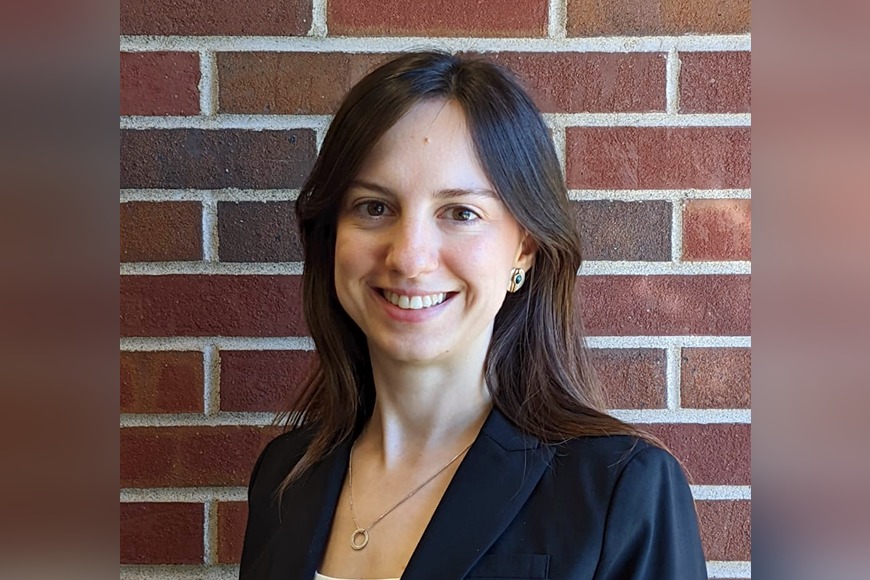
Ezgi Ozcelik
|
Ezgi OzcelikDepartment of Political Science Political science graduate student Ezgi Ozcelik engaged in a summer research assistantship with the St. Anthony Park Community Council. Tasked with collecting and analyzing data on the neighborhood’s use of a public park, Ozcelik had the opportunity to develop her research skills while working out in the community. She says the experience “enabled me to explore what I enjoy at my job as a researcher and introduced me to conducting research for the community.” |
Summer 2022 Internships
Department of Political Science
During my internship with IPUMSI, at the University of Minnesota, I worked on the Labor Force Surveys Integration project. I helped to build partner relations with research institutions in Brazil and the US and researched, analyzed and produced reports concerning the availability of labor surveys metadata and microdata. I had the opportunity to work with a large team of researchers and data analysts, which introduced me to a different mindset concerning the ways of implementing transparent and reproducible research. I learned how to deal with several issues imposed by the harmonization of cross-country and time-series microdata. Apart from that, in this project, I had the opportunity to contact, meet and take part in deep conversations with several experts whose input helped our team to strategically organize the necessary steps to move forward with this extensive and fundamental project.
My internship with IPUMSI showed me in practice what I have learned in theory at the Internship Program - that the skills that I have built as a Teaching and Research Assistant and the knowledge I have acquired in my graduate program are transferable to different sectors. My communication, data analysis and management skills have been extremely useful to speed up several aspects of this project. This experience also helped me to identify what I value most in a job.
First, the institution’s mission, which is democratizing the access to comparable census and survey data from multiple countries and time periods, helping researchers from all over the world to inform public policies here and elsewhere. Second, it made me realize that working in a team and being able to meet people and discuss and plan projects, activities and contributions with them have become essential features that have brightened my internship days. Thus, I would like to have these experiences as part of my working routine in the future.
Finally, this experience helped me to understand the career path I want to pursue and the sector I want to work in. In the meantime, I am glad and thankful that I was offered the opportunity to keep working as an assistant for the next academic year and keep contributing to this amazing institution that helped me to strengthen multiple skills and learn new ones. I hope this experience makes me a competitive candidate when it comes to my entrance into the job market in the near future.
Department of Spanish & Portuguese Studies
Through the Summer 2022 CLA Internship Program, I wrote and piloted the Small Business Development Internship. The goal of this internship is to teach entrepreneurial-minded PhD scholars to navigate the small-business startup process. Ultimately, the opportunity helps scholars learn to package, market, and sell their PhD-learned expertise as a profitable product or service.
During the summer of 2022, I worked closely with and learned from other Minneapolis BIPOC entrepreneurs to understand and begin the process of establishing my own digital media business. My soon-to-be-launched business, the Multicultural Media Company, brings digital storytelling strategies to projects and initiatives that represent historically marginalized communities and cultures.
To begin my new company, I first strengthened my own online presence by refining my digital portfolio of my media productions. Additionally, I improved and increased my own social media presence, implementing niche marketing with video content focused on diverse media representation. Next, I researched and tested digital media methods focused on Instagram brand strategy, growth, and engagement. With the implementation of these strategies, I produced video content ranging from 5,000 to over 29,000 views, growing my personal Instagram account by 10%.
My digital media work quickly received national recognition! In June of 2022, I was invited as the expert speaker for an event hosted by the American Association of Applied Linguistics titled “Writing for the Public: Translating Academics to Activism” (webinar recording). During the event, I taught strategies for scholars looking to market their social justice-based scholarship.
Once strengthening my digital presence and defining my media strategy, I established working relationships with clients in three different sectors: natural conservation and recreation, foreign language education, and diverse culinary storytelling.
In the summer of 2021, I worked with the University of Minnesota Extension Regional Sustainable Development Partnerships to write the marketing and outreach plan for the Driftless Area Karst Trail. This conservation project was launched by the National Speleological Society, the Minnesota Department of Natural Resources, and the National Park Service - Rivers, Trails, & Conservation Assistance Program. With the help of the 2022 CLA Internship Program, I spent the summer implementing and refining the trail’s original marketing and outreach plan. The digital media content I planned, researched, produced, and published on their Instagram account reached a range of 1,000 to 9,000 views. The best part: their account following grew by 12.5% during the course of my CLA Summer Internship!
My second summer client was the Spanish-language educational service, MorSpanish. I worked with the company’s CEO to define goals for their existing Instagram page. Then, I created and implemented an updated brand strategy to increase the account’s followers and organic reach. In three months, I grew the account’s following by 31%, producing video content that reached over 2,300 views.
Finally, my company’s most involved summer project was the development and implementation of a digital brand strategy for the newly launched non-profit organization, the BIPOC Foodways Alliance. For this project, I worked closely with local BIPOC entrepreneurs, including indigenous writer and chef, Sean Sherman, and MPR-published Black food writer, Mecca Bos, to found and develop the non-profit. Over the summer, I launched the project’s Instagram account, growing it from 0 to over 1,000 followers in three months, and produced video content that reached over 11,000 views.
Overall, my Small Business Development Internship through the CLA Internship Program has allowed me to launch an increasingly successful digital media production business, learn entrepreneurship from accomplished entrepreneurs, and establish working relationships with clients for my company. Moving into the next academic year, I will even be joining the board of the BIPOC Foodways Alliance as the media director! Ultimately, my CLA internship gave me the time and space to establish myself as an entrepreneur and sell my PhD-learned digital media skills to pursue my passion for advocacy and change.
Department of Geography, Environment & Society
During my internship at the Guidewire Software Inc., I worked on several projects involving geospatial data collection, international fire station database standardization, vector data analysis, and visualizing maps for hazard projects. I implemented my project for two countries. This project was for Canada and Australia and involved collecting and analyzing GIS datasets and developing a hazard-based database. As a result, I provided a set of data layers for fire hydrants, fire station, hydrology, elevation, and coastline to update, change, or implement geospatial predictive modeling that go in line with the tech for insurance industry. For this project, I used different analytic packages and plugins in QGIS software, OSM, and Google Maps.
Along this project, I dedicated and continued strengthening my transferable skills in writing, communication, and presentation which will be beneficial for my future career. I enhanced my professional skills associated with management of GIS databases and innovative cartographic styling of maps. Furthermore, I was in close contact with internship supervisor, manger, and trainers who helped me got familiar with the company organization, teams, and projects.
However, the greatest appeal of this internship is the opportunity to identify the career path that I want to pursue. I learned how to work in fast-paced workspace within a creative team-based environment. That is why, as a first-generation university student, I greatly value the moral of support and peer learning in the form of team-oriented projects. After my internship, I am thrilled by the unique positions available through my major. I hope I will have the opportunity to work with this multinational company in the future. But, even if that doesn’t work out, I appreciate the valuable learning and networking experiences.
Department of Sociology
I applied for an internship at the Minnesota Council of Nonprofits to work on the annual state-wide economy for nonprofit organizations. After my interview, the assistant director offered me an internship to conduct a more demanding research project that focused on understanding the impact of current events and COVID-19 on Minnesota nonprofit organizations. Receiving a more complex assignment provided me with a confidence boost.
The goal of my internship was to design and implement a survey of Minnesota nonprofit organizations examining the impacts of current events and COVID-19 on their organizations. This complex goal includes economic, workforce, social, and community issues. Internship activities included designing the survey tool with input from internal and external stakeholders, analyzing data, and creating a report in Adobe Indesign. This project allowed me to practice bringing together my technical skills, understanding of social and economic issues, and design skills.
When considering my career trajectory, I tend to think I am not skilled enough to get a research job. I have a clear case of impostor syndrome. This internship helped me overcome the idea that I am not prepared or skilled. The scope of the project allowed me to practice skills in a non-academic setting.
One of the best parts of my internship was the organizational culture. It became clear to me quickly that the people working at MNCN support each other, value everyone’s contributions, and have a work-life balance. The onboarding process was straightforward and provided me with all of the tools that I needed to be successful. The people in the organization that should be involved in the process clearly understood their role, communicated quickly and clearly with me, and provided clear and useful feedback. While this may seem like basic workplace culture, I have not always experienced such a positive and collaborative culture in other work environments.
This internship is beneficial to my career in a few different ways. It is helpful to have independent, non-academic experience on my CV which can also serve as a writing sample. I have gained professional contacts who can speak to the value of my work and skills. And finally, I had the opportunity to test the idea that I can see myself doing research and program evaluation professionally either in an organization or as a contractor. Further, I am able to define the skills I have that apply to non-academic research.
The internship program and the support received from MacKenzie Sullivan were immensely helpful for navigating the job search and application process.
Department of Communication Studies
During my internship with The Advocates for Human Rights, I worked on several projects with the Women’s Human Rights Program. My primary role as an intern was to observe criminal court proceedings in Hennepin and Ramsey county courtrooms to determine how judges and other court authorities respond to cases of sexual and gendered violence, a project in line with my academic work focused on criminal legal responses to such violence. Additionally, I assisted in the Women’s Human Rights program’s work to collect, manage, and analyze data about how Minnesota courts adapted to virtual court proceedings amidst the COVID-19 pandemic. During my time with The Advocates for Human Rights, I contributed to each of these projects by offering research skills and critical insights that enabled me to point to the patterns of disparity, inequity, and exclusion embedded in the Minnesota criminal legal system. As I worked on my assigned projects and made these contributions, I gained a number of skills related to data management and synthesis, but more importantly, I learned a lot about communicating complex information to various nonacademic audiences to inform policy reform.
Throughout my time in the CLA Internship Program, I took what one of the members of my small group called a “practical approach” to pursuing future career trajectories. As I applied for internships, I also applied for academic positions in my discipline. During the week of our final Internship Program meeting, I was offered a tenure track position at Skagit Valley College, a community college in Washington. Although my future career path will not lead me directly to nonprofit or human rights work, I am confident that my time in the CLA Internship Program positioned me as a good candidate for my new academic job. In fact, during my interview, I directly referenced my time in the program to demonstrate my commitment to helping students achieve their career goals. The language and strategies I used for resume building, job hunting, and interviewing enabled me to communicate how I intend to serve students and contribute to their professional development in concrete and compelling ways. I am confident that I will use these skills in the classroom, as an academic advisor, and in my new community to help connect students with internship and job opportunities. In addition, my time with The Advocates for Human Rights illuminated that I find work grounded in my community fulfilling and invigorating. As I settle into life in Washington, I will carry my fantastic experience in the CLA Internship Program and as a Women’s Human Rights intern with me as I continue to work with community organizations focused on violence prevention and human rights advocacy.
Department of Speech-Language-Hearing Sciences
As part of the CLA Graduate Internship, I interned as a UX researcher with Roku, which is a tech company that provides a range of entertainment products, such as TV, players, soundbars, streaming channels.
My primary project is a contextual interview of people with low vision/blindness to find out how they spend their free time, how they watch TV, and if there is anything that can be improved with their current entertainment set-up. I had the rare opportunity to collect qualitative data in people’s homes. The experience opened my eyes to the challenges faced by people with disabilities, and the impact that technology has on their lives.
I feel that my academic research skills can transfer to an industry setting. I can work independently to synthesize prior research, to develop a study protocol, to manage the logistics, to analyze results, to put together a deliverable, and to deliver things on time. I feel that, while we are in the PhD program, we should be secure in the belief that, if we can make it here in academia, we can make it anywhere. The problems we solve as PhD students can absolutely transfer to an industry setting, and the training we received is not going to waste if we were to leave. At the same time, having an internship definitely helped me to learn the business and about collaborating with a cross-functional team of researchers, designers and product managers to achieve the same goal. I also received a lot of coaching from my internship manager. She makes me feel that I can ask all the questions I have, and I learned a lot from her while we collect data in the field.
Besides the projects, I also get to sit in a lot of career coaching sessions put on by the university recruiting team, such as resume reviews and zoom chat with the founder and vice presidents of the company. These workshops make me feel that the internship is an extension of one’s education rather than just a temporary job. For that reason alone, I would recommend anybody to get an internship just to know better about the labor market and the opportunities out there. In academia, professionals appear to have a linear trajectory from PhD to associate professor to full professorship. It’s really fascinating to see industry jobs often lead to different kinds of opportunities. New jobs were invented as traditional jobs wane. People can be laid off as the macro-economy fluctuates but still land on their feet, because there are a lot of opportunities out there.
An internship is a valuable bridge between academia and the industry. The experience helped me see my strengths and weaknesses better, and helped me prepare for my job search as I enter into my last year in my PhD program.
Department of Sociology
In summer 2022, I worked as a health equity research intern in the Research Division of Planned Parenthood North Central States (PPNCS). I primarily worked on a research study about male contraceptives called the contrasperm project. I contributed to the qualitative part of the study by developing materials for focus groups that sought to understand the decision-making processes of people who produce sperm and their partners. I developed a facilitator training guide used to train focus group moderators.
The second part of my internship involved a health equity reading group. The readings covered topics related to equity and justice, including historical racism in reproductive health and research, reproductive justice movements, and current issues in public health research and reproductive healthcare. All team members participated in the reading group; thus everyone had a common understanding of the ways racism and other oppressive systems impact reproductive healthcare.
I was also invited to spend a day on-site in the Minneapolis clinic, where the research division has their offices. Clinical research, such as clinical trials for new contraceptive devices, make up the majority of the research projects at PPNCS. I toured the facility, learned about current clinical research projects, and observed team members working on various clinical trials.
The biggest thing I learned from my time at PPNCS is that it is possible to create a respectful and supportive work environment. Since the research division is growing, they are creating and implementing new processes and establishing team members’ roles and responsibilities. I observed very thoughtful, collaborative, and intentional discussions. For example, when team members take on a new task they are asked, “do you have the capacity and support to complete this task?” And if they say no, others are ready to step in to support them. Each team member is valued, including interns. I felt very welcomed during my internship.
Working at a place outside of a university setting reminded me that my skills are transferable outside of academia. I was well-prepared for the work I did at PPNCS. During my internship, I gained knowledge about reproductive health research, including gaps in the research where I could see myself contributing in the future. Before this experience, I would not have considered clinical research in my future career prospects, but now I see that is a possibility for me. Ultimately, my internship with PPNCS reinvigorated my commitment to using my skills to work towards solving social problems.
Summer 2021 Internships
Department of Political Science | PhD Candidate
During my internship at the University of Minnesota Libraries Publishing Services, I worked on several projects involving journals’ policies, preservation procedures, and formatting files for digital publishing platforms. I implemented two projects. The first one involved collecting and analyzing journals’ policies and compare these to the publisher’s goals and guidelines. As a result, I provided a set of recommendations for journals to update, change, or implement policies that go in line with the publisher’s open access policies. For this project, I also developed a series of recommendations for journals to improve their peer review process and authors’ submission guidelines.
For the second project, I implemented a preservation plan for the publisher’s journals. I collected and analyzed existing data from Portico (a digital preservation service) regarding preserved articles. Based on this data, I developed and implemented a plan to improve articles’ preservation procedures. As a result, I updated and improved the preservation system across all journals by identifying issues that prevented articles from being exported to Portico. The publisher now has a clean dataset detailing which articles were successfully preserved and identifying articles with errors that prevented them from being uploaded.
My internship with the University of Minnesota Libraries Publishing Services will contribute to my career in several ways. First of all, the internship has helped me identify the career path that I want to pursue. Second, this experience has helped me strengthen my project management skills by implementing and improving two crucial projects for the publisher. Finally, the internship adds to my experience in publishing, which provides me with the necessary resources to apply for a job in the near future.
Department of History | PhD Candidate
My internship was one developed in conjunction with the Wangensteen Library and the Chares Babbage Institute, which would involve me developing research guides based on specific topics for both institutions. Known as “libguides” within the system my job was to create at least three guides: one for the Babbage’s collections, one for the Wangensteen’s, and one that would collate items from both collections. The goal was to both create aids which would benefit the individual institutions as well as encourage researchers to consider opportunities from multiple archival and library institutions rather than from a single source.
This was a challenging task in many respects. I needed to learn how to handle the logistical backend, especially given the fact that we were still deep within the Covid-19 pandemic which made archival access more difficult. Furthermore, the Wangensteen was moving to their new location, which was an enormous project given the size of their collection. Finally, I had to deal with my own personal challenges at the time, prime of which was a pressing medical problem which required surgical intervention. Nevertheless, I was able to create three sizeable libguides, learning how to use the tools provided to me in order to make them as helpful as possible.
This was an excellent internship, affording me the opportunity to learn how to curate and evaluate items for usefulness in specific topics. It has also afforded me the opportunity to help discover interdisciplinary potential between two archives with drastically different collecting goals and eras, and I am glad to get the chance to help others find the same. Finally, I have been able to develop smaller skills, such as tracking work times and utilizing specific web programs, all of which will help me in non-academic careers. Overall, I feel I came away from this internship with both new and refined skills, and it has been a greatly positive experience.
Department of Theatre Arts & Dance | PhD Candidate
As a first-generation disabled college graduate from rural Minnesota, I found myself not in a doctoral program by design but by happenstance. Growing up, I spent my childhood in the care of people called “Dr.” Hence, I went to graduate school not because I loved thought for thought’s sake, but because I sought the social legitimacy of those same people.
As my research focus became clear (understanding the historic and ongoing segregation of disabled Americans in custodial institutions), my question of “what’s next?” grew fuzzy. While I found myself immersed in the debates within my discipline, I also questioned if I had made the right choice. What if teaching isn’t for me? Would gaining a doctorate in theatre historiography truly provide me with the skills I need to succeed in the professional world? Did I doom myself to an unintentional fate of self-doubt and career pessimism? Now, after completing the College of Liberal Arts (CLA) Graduate Student Internship program, I can tell you, my dear reader, I learned more than what the difference between a résumé and a CV is. What I learned is a simple, but an often-elusive concept for graduate students: to believe in myself.
This summer I served as the Disability & Aging Policy Intern with Senator Kirsten Gillibrand’s Office (D-NY). I worked directly with the senator’s senior advisor to draft legislation that will provide funding for and technological support to direct support workers (DSW). DSWs provide essential in-home care supports to disabled people. (Everything from helping someone get dressed in the morning to taking notes for a student in class.) In addition, most DSWs are women and people of color from lower- and working-class backgrounds. The legislation I helped create will not only help bolster federally funded wages for DSWs but also create a program to train DSWs in how to use new assistive technologies.
The internship program equipped me with invaluable skills. It provided me with the soft skills I needed—like networking and learning the minute differences between academia and the rest of the world. But it also taught me technical skills—like understanding how to convert a CV into a résumé and how to draft policy memorandums. Ultimately, I learned the ins and outs of getting a piece of legislation into draft form. (Turns out it’s not nearly as simple as I thought.)
In a rather ironic way, this program also helped me to appreciate my research, my dissertation, and my program more. In hindsight, I found that my doctoral studies had already equipped me with most of the skills I needed. Fundamental research and teaching skills—like verbal and written communication, data analysis, and synthesizing lofty concepts into easy-to-understand deliverables—proved invaluable to my time working on the Hill. I connected my research with “real-world” problems faced by the constituents I served this summer. In doing so, this helped me address those problems at a national, systematic level. But, to my surprise, it also helped me find new joy in the often-perilous process of writing my dissertation.
Finally, this internship taught me not to put so much stress on choosing between academic or non-academic jobs. As I mentioned earlier, I did not understand that getting a PhD traditionally means entering academia after graduation. While my advisor and my program (thankfully) emphasize career professionalization early, I felt like I could only choose one or the other. This internship program showed me I can let my professional work inform my scholarship and vice versa. I now know what I want (and do not want) to do when I graduate.
Most importantly, it has reminded me why I continue my doctoral education: I do this not just because I want to be called “Dr. Stenberg” one day. I continue with my doctoral education because I want to serve the people from my community. My doctoral training, along with this internship, has given me the tools to do just that.
Department of Gender, Women & Sexuality Studies | PhD Candidate
As part of the CLA Graduate Internship, I interned as a researcher with UNITE HERE Local 11, which is a hospitality workers’ union representing 32,000 members across Southern California and Arizona.
This internship provided invaluable experience conducting nonacademic research to organize issue-based campaigns and build a progressive political movement. I learned practical skills researching and writing a white paper, conducting voter outreach, communicating with local government, organizing actions, and tracking local politics in 20 cities on a weekly basis.
Working with the research team, communications team, legal team, and labor organizers was an incredible opportunity to learn from their wealth of expertise, and also showed me that I work best in collaboration.
Just as importantly, I learned that academic skills truly do transfer to nonacademic jobs. The ability to quickly locate, read, evaluate, and synthesize multiple sources of information on an unfamiliar topic and communicate it to a variety of audiences is extremely useful to organizations operating on that information in real-time. Even mundane academic skills, like using research databases or uploading final grades with csv files transferred to working with other types of data.
After my internship, I was asked to stay on as a part-time researcher, which has since become a full-time offer. I’m reluctantly passing, in order to finish my dissertation. I hope I will have the opportunity to work with this organization in the future. But, even if that doesn’t work out, knowing that nonacademic research jobs exist and that my academic training has given me the basic skills to do them is valuable in and of itself.
Department of Psychology | PhD Candidate
I worked as a graduate student research assistant at the Federal Judicial Center (FJC), which is an independent research and education agency within the judicial branch. My past research experience on workplace harassment and representation made me a good fit for a project on workplace conduct in the federal courts. I worked with senior researchers at the FJC to develop a survey template that can be used and adapted by the courts to measure workplace conduct and culture.
Also, I worked with the American College of Bankruptcy to help the newly created Diversity, Equity and Inclusion (DEI) Commission. I collaborated with the DEI Commission to create a survey assessing diversity and inclusion in the College. Over the summer, I gained experience in how research differs in a non-academic setting and how to balance stakeholders’ preferences with research interests. I’ll be continuing my work at the FJC part-time throughout the academic year, and I’m excited to continue working on impactful and interesting projects at the FJC.
After graduate school, I am interested in further developing my skill set at the intersection of science and policy by working in government or the nonprofit sector. I am interested in applying my research and data analysis skills to understanding consequential problems and to develop and test interventions. In particular, my goal is to work in an area where I can develop approaches to reducing prejudice and enhancing fairness in the legal system that are both theory-driven and practical to implement.
My summer at the FJC is an important step towards learning how to adapt my past research experiences to a new setting in government. In federal and state governments, there are opportunities for scientists to use their expertise to engage directly with the legal system, such as working at the FJC. At the level of state government, the National Center for State Courts (NCSC) conducts research to improve the administration of justice in state courts. For example, the NCSC is currently studying whether a video on implicit bias during jury orientation is effective in educating jurors.
There are various career paths within government, both at the federal level and state level, that would allow me to use my research and analytic skills to study stereotyping and ways to enhance diversity in organizational contexts, including the legal system.
Similarly, in the non-profit sector, the Pew Research Center conducts public opinion polling to understand attitudes and inform policymakers on a variety of issues. By using social science research and methods, the Pew Research Center studies and reports on data-driven trends and issues, including issues related to diversity.
Through my internship at the FJC, I hope to gain a foothold in policy research, either in government or nonprofit organizations, that will continue after graduate school. I hope to escalate my efforts to gain the necessary experience to pursue my goal of advancing psychological theory while also finding ways to improve the administration of justice in real-world settings.